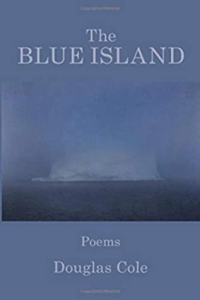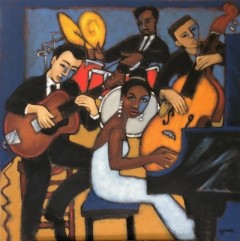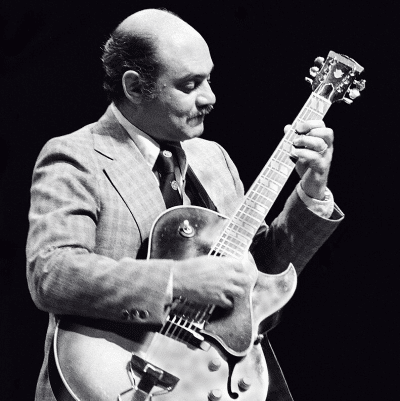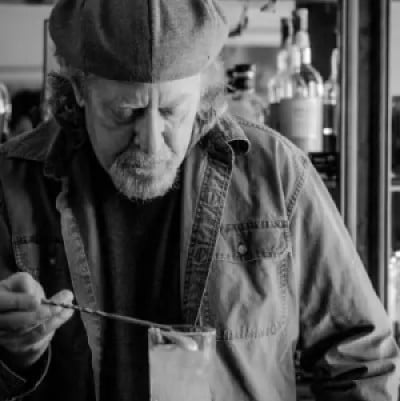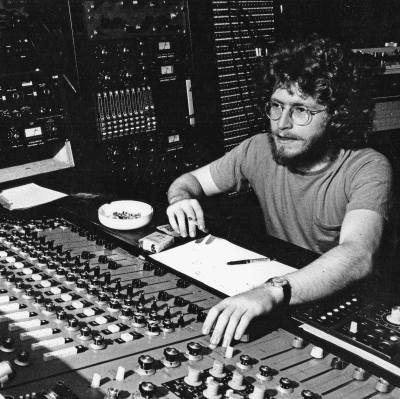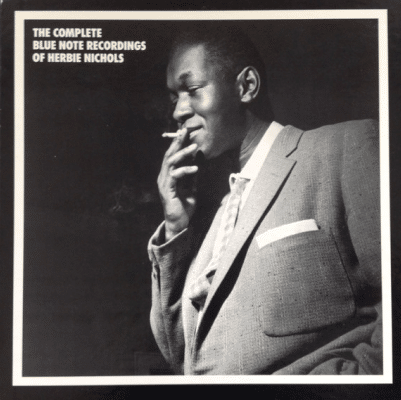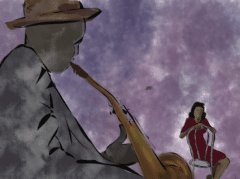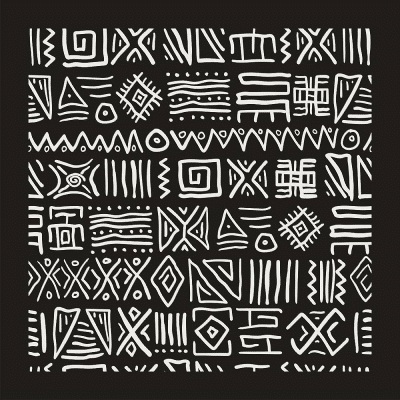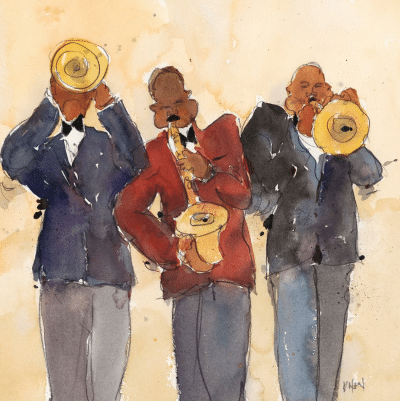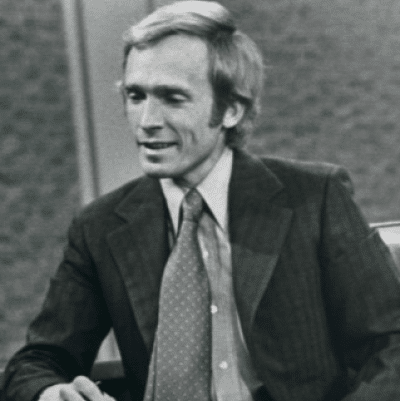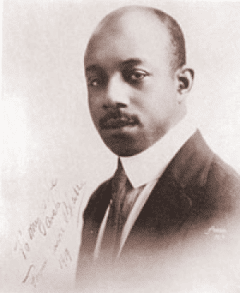.
.
Trading Fours with Douglas Cole is an occasional series of the writer’s poetic interpretations of jazz recordings and film. This edition is written in response to the music of Wayne Shorter.
A recording of Mr. Cole reading his work is found at the beginning of each of the three parts of this poem. His readings are accompanied by Berklee School of Music graduate Steph Gemm, who wrote the music specifically for Mr. Cole’s work.
.
.
___
.
.
.
The cover of Wayne Shorter’s 2018 Blue Note album Emanon/art by Randy DuBurke

.
.
.
Notes on Genius
by Douglas Cole
.
.
Part One: The Flash
.
Listen to Douglas Cole read this poem
.
Born into wonder,
walking through empty space,
the known and more unknown,
between ecstasy and grace,
all so there you might not notice.
(Hindu belief that reality is music.)
Back in time mysterious traveler,
in realms of the strange and terrible,
the city is moving so fast that now
you can barely hear it, see it
but as fury, beautiful and chaotic,
a mandala, fire, a cosmic kitchen,
and they’re circling the center
of the vacant lot in a rolling
natal dream of Mars.
What art will come of this?
About home, the great memory,
the origin story of a superhero
with pop sci-fi relics ghostly walking
down the long hallways of the past
into a childhood head full of summer,
in a friend’s basement dark watching
When Worlds Collide, re-entering
the daylight neighborhood stillness
and looking up for the big explosion
in the fuzzy air between movies and life.
Doctor Strange and Mr. Weird
in stingy brim hats and floaty coats
going where no one else can go,
the DNA of the whole
universe inside one note.
Lloyds Manor, keys I’ve not heard
but with some Berkeley flair,
sound of weed smoke in the garden,
a whiff from the street back there
and moons of night blooming Jasmine,
the jazzman time makes at hand,
time coming out of nowhere
as a draft notice, a thought to start over,
like this—
What year is this?
What key is it in?
Who are these swift players
so poised, so proud,
so sophisticated in silver suits,
in evidence, complicated, free,
a promethean burst of energy
onto the scene at lightspeed,
discovering the music in the music.
From one corner of the world
to another under hot lights,
interviews, accolades, flights and gigs—
Who designed your jacket?
Where do you get your ideas?
Night dreamer says not beware,
But ….be aware:
up to Olympus at 103rd and Amsterdam
in a vital tonal blast, an eruption.
And what do you find? Who?
What story going in…the tone?
Speak no evil, crown jewel,
opening doors of possibility,
infant eyes in state of becoming,
the child arriving here and now,
thoughts tumbling from a blank
page in a home that is the world.
“Extremely fast, profoundly deep,”
this territory of ESP Carlos claims
within reach in the wily puzzle
of talking air between you and me—
and the reaction I get thinking back
is that the equation signifies
a thought coming down the hallway,
a voice saying, you know what,
is this just crazy or genius?
Schizophrenia in a search
for the holy book, anti-music,
to free mind and see exactly
how far we go in open starlight
down a street with a babbling,
entertaining observer saying,
where’s this coming from, anyway?
Everywhere you go everything is happening.
Footprints along the magic baseline
with giant strides of music coming
out of a seemingly empty hotel room,
Tom Thumb leaning on the luxury bar,
swimming with the water babies
in a mind-blowing brew, a holy writ,
diving into space made out of sound.
What is this where, this stuttered echo,
with Patton scanning the battlefield
remembering wars past, Carthage
and other incarnations riding in
on divine winds.
Fey ugly beauty, marriage of opposites,
an homage to negative space,
peeling back an eyelid on an eye
you didn’t know you had, picturing
what will be, limitless and free-floating,
embryonic yet awake in the black milk
you never knew until this journey,
like the astronaut’s death dream in 2001
A Space Odyssey, river silent till you listen
at last and enter at the end of the universe.
.
.
Part Two: Faith Fearless
.
Listen to Douglas Cole read this poem
.
In the odyssey of Iska,
no beginning and no end,
everything is potential,
out of shock and sorrow,
empathy to the marrow
in joy and expanding space,
on a race with time, baton-trading
down the heart-mind road,
reporting back from everywhere.
This is when, time traveler,
in a story from the glory days
by a great composer mad at midnight,
the head rings with moonlit ideas
that want out on the page there, see?
And all this is a conversation
between giant beings
wherein we are what’s spoken—
So what syllable or pause are you?
Can you tell me, Mr. Wizard?
This is going on at the atomic level,
here and here at the same time,
sliding into a magic cocktail night
on the go—we’re always on the go,
catching a glimpse of the sacred ox
around every New York corner.
The whole register, the mythos
pool of warriors, dreams to render,
this …..you listen and you want,
the nature of the instrument is
to partake, yet to hear this is to be
in sympathetic vibration, as one
cello picks up the tone of another
and says who are you in wander,
who were you before, now a duet,
and the world will still be there
when we return whistling in the dark.
Under such a supernova,
who doesn’t want to slip
into the shade of a palm tree
on a long quiet beach
with the waves sing-songing,
wish-hissing, ah, once in a while?
Native dancer, Ponte de Areia,
time is also lost and voracious
all around us everywhere,
though what we know disappears—
but like miracles we come back
again and again until we don’t,
but then who knows, do you?
When the universe is paved over
and glows through edges and cracks,
put a window in the strings
for the searchers in their red shoes
so we can get out of here at last.
Late for a flight but flying light,
you ever had the feeling you were
floating through another’s life?
History sometimes inserts us
into various footnotes, page-links
here and there at the same time,
reading the news and out at sea,
wave-hopping, over-souling,
but on the go constantly.
The constant waits to know us,
a friend in the end to walk with
along the evening road
through circles of streetlights
all in a row
like a beautiful stage set
on a cosmic game show,
the ocean breathing,
pregnant with history,
sky bending down
to whisper, come with me,
as she moves through the fair
with mystical attraction
and indestructible happiness.
.
.
Part Three: Close Your Eyes and There’s the Movie
.
Listen to Douglas Cole read this poem
.
Because the more we age the younger we grow,
because he sees the things we cannot see
but provides us with a way to see them,
like poetry, we’re free of the limited ways
we think and feel, TV always going
in the background, a pile of manuscripts,
tablature countering noise with sound,
parries off the evil news with prayer,
wish songs or the ever-soulful silence
because you can’t rehearse the unknown,
confronted with uncertainty, your home,
until writing is the only way there.
Old man, what do you have to say?
Old man, you didn’t wander off
to your mountain cabin, luring though it is.
Instead, you’re here rolling boulders
with a magic flute, and who knew
an empty cave was another door to sky?
New scene on scene come to being
with a new director and a new script,
revisions and deep harmonic tracks,
the drummer walking through walls,
there then gone, going, going—
then there again on the screen,
improvising so it’s difficult to lie,
in theaters of cruelty, theatres of war,
theaters of operation and plunder,
we act out time one way or another,
down there in the worldly world
for a moment lost in wonder.
Flashlight beam in the darkness,
and even in the worst movie
there’s music on the lost horizon,
the constant constantly looking in,
noting every grain by grain
as mountains keep on shrinking,
the sun sputtering out, constant
all the way from that in-sucking
gallows-frenzy back to darkness
so heavy no ray of light escapes,
death you think, yes death is constant,
a head underwater holding breath,
rising and letting that breath go
and taking in another—that’s death,
this life is the head under water
holding that breath however long.
Is the head the real you? Or the breath?
Is it soul, spirit fire, great mind
dipping into the storyflow?
Is that the constant changing
dance all at once upon a time?
Who keeps the world afloat?
What keeps the dream alive?
While the rest of us are sleeping?
Extra credit, fill in the blank__
what’s one night in the eyes of eternity?
When they’re not notes anymore
but big galaxies singing?
What does freedom sound like?
The frequency of change,
the great adventure, the constant?
Iphigenia sings she cares,
and cavorts as she comes
freely into the vacant lot,
swirling with the city dust,
the fallen towers,
the tumbling ash where
two boys stand twinned
before the imagination
summoning, repeating,
enjoying there the whole
universe in a nutshell,
going and ongoing,
constantly making up songs.
.
___
.
.
Listen to “Pegasus” from Emanon, the 2018 album by The Wayne Shorter Quartet with the Orpheus Chamber Orchestra [Universal Music Group]
.
.
.
.
Additional links to Wayne Shorter’s music referenced in the poems:
.
ESP (with the Miles Davis Quintet)
Bitches Brew (with Miles Davis)
.
.
Click here to be taken to Zero Gravity, the cinematic ode to Wayne Shorter, produced by Brad Pitt and directed by Dorsay Alavi.
.
.
___
.
.
photo by Jenn Merritt
 .
.
Douglas Cole has published six collections of poetry and The White Field, winner of the American Fiction Award. His work has appeared in several anthologies as well as journals such as The Chicago Quarterly Review, Poetry International, The Galway Review, Bitter Oleander, Chiron, Louisiana Literature, Slipstream, as well Spanish translations of work (translated by Maria Del Castillo Sucerquia) in La Cabra Montes. He is a regular contributor to Mythaixs, an online journal, where in addition to his fiction and essays, his interviews with notable writers, artists and musicians such as Daniel Wallace (Big Fish), Darcy Steinke (Suicide Blond, Flash Count Diary) and Tim Reynolds (T3 and The Dave Matthews Band) have been popular contributions. He has been nominated twice for a Pushcart and Best of the Net and received the Leslie Hunt Memorial Prize in Poetry. He lives and teaches in Seattle, Washington.
Douglas’ poem, “What We Talk About When We Talk About Kind of Blue,” published as part of his “Trading Fours” series, was nominated for the XLVIII Pushcart Prize
Click here to visit his website
.
.
The poet’s collection, The Blue Island
.
.
___
.
.
.
.
___
.
.
Click here to read previous editions of Trading Fours with Douglas Cole
.
Click here to read The Sunday Poem
Click here to read “A Collection of Jazz Poetry – Winter, 2024 Edition”
Click here to read “The Old Casino,” J.B. Marlow’s winning story in the 64th Jerry Jazz Musician Short Fiction Contest
Click here for information about how to submit your poetry or short fiction
Click here to subscribe to the (free) Jerry Jazz Musician quarterly newsletter
Click here to help support the ongoing publication of Jerry Jazz Musician, and to keep it ad and commercial-free (thank you!)
.
.
___
.
.
Jerry Jazz Musician…human produced (and AI-free) since 1999
.
.
.
.
.
.




